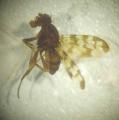Diptera.info :: Miscellaneous :: General queries
Who is here? 1 guest(s)
|
Regarding Diptera
|
|
| Moviereel |
Posted on 10-01-2005 10:37
|
|
Member Location: Posts: 1 Joined: 08.01.05 |
Recently had a viewing of the site with girlfriend and she found it interesting, One question cause i'm completly new to this genre of study is Diptera just the insects? |
|
|
|
| Paul Beuk |
Posted on 10-01-2005 11:03
|
|
Super Administrator Location: Netherlands Posts: 19403 Joined: 11.05.04 |
Diptera are the two-winged insects, flies and midges. Diptera litterally means 'Two Wings'. In this group you will find the bottles, house flies, mosquitoes, black flies, crane flies, horse flies, and what have you. Virtually all insects have four wings (butterflies, dragonflies, grasshoppers, wasps, lacewings, etc.) but wings may be reduced. Worker ants, for example, are essentially wasps without wings but when you see the winged ants (queens and males) and compare the with yellowjackets, then the resemblence is obvious. Mind you, when the wings are folded over the body, it may not be clear that some insects have four wings. Also, the hind wings may be much smaller than the fore wings and rather inconspicuous. When you take a look at beetles, the shields over the abdomen are the two fore wings, the hind wings (if 'functional'  are folded under these shields. are folded under these shields.Evolutionary speaking, the Diptera have four wings, but the hind wings are modified to halters that have a balancing function when flying. There are no Diptera with functional hinf wings, though in Drosophila (fruit flies) there are mutant strains where the hind wings are developed as in other insects and not reduced to halters. Diptera are one of the more speciose orders of insects. Other orders that are very species-rich are the Hymenoptera (wasp, sawflies, ants, bees, bumblebees, etc.) and Coleoptera (beetles). In the UK there are about 8,000 species of the Diptera... Paul - - - - Paul Beuk on https://diptera.info |
| Jump to Forum: |













